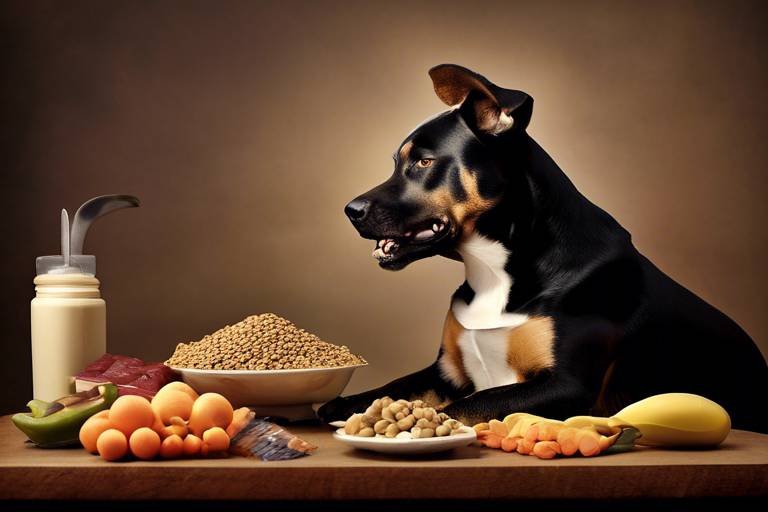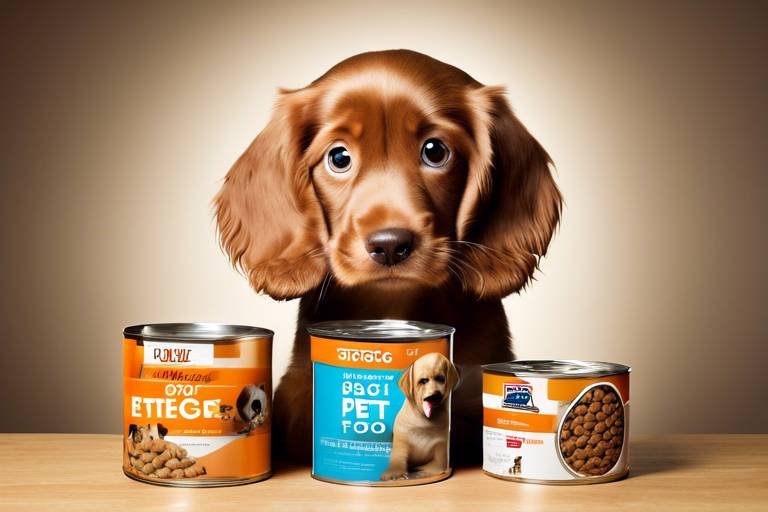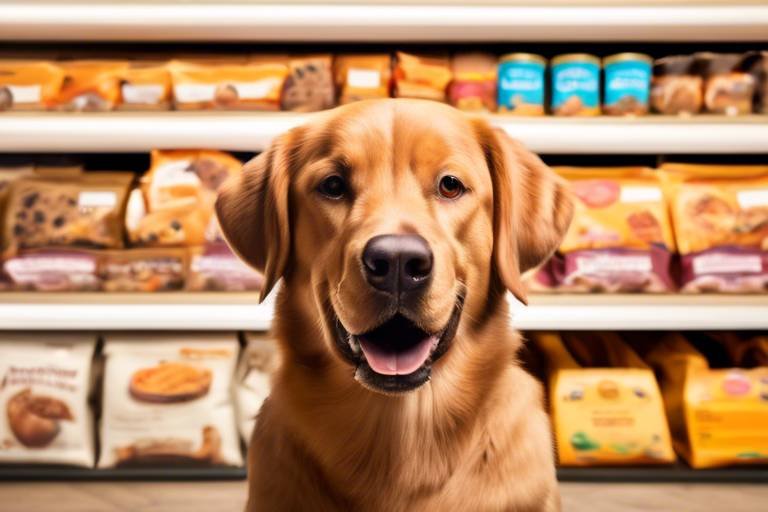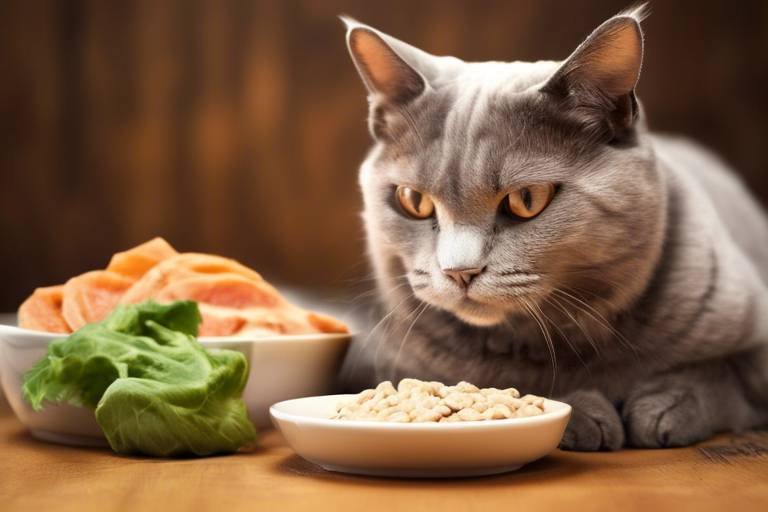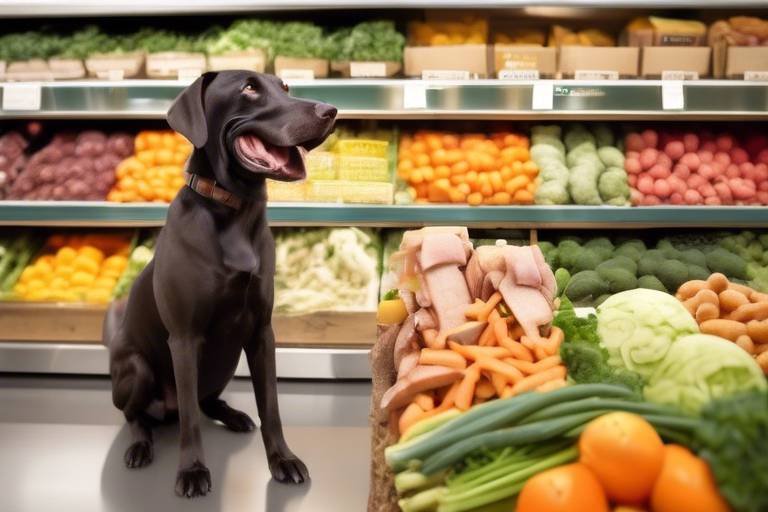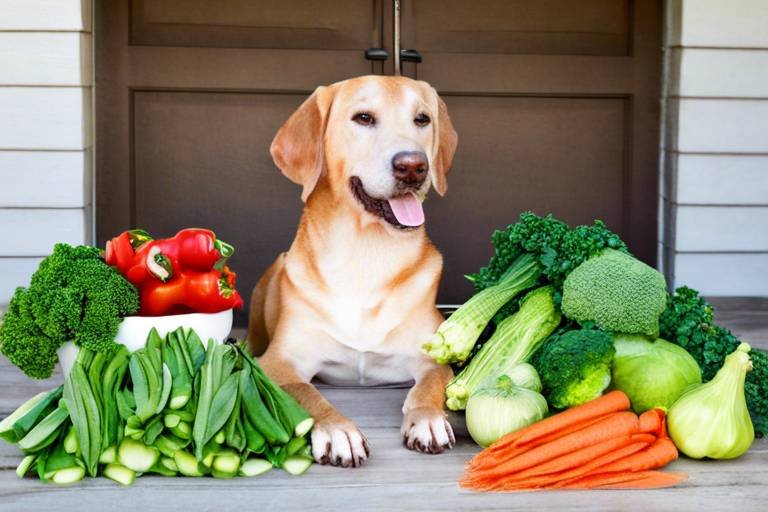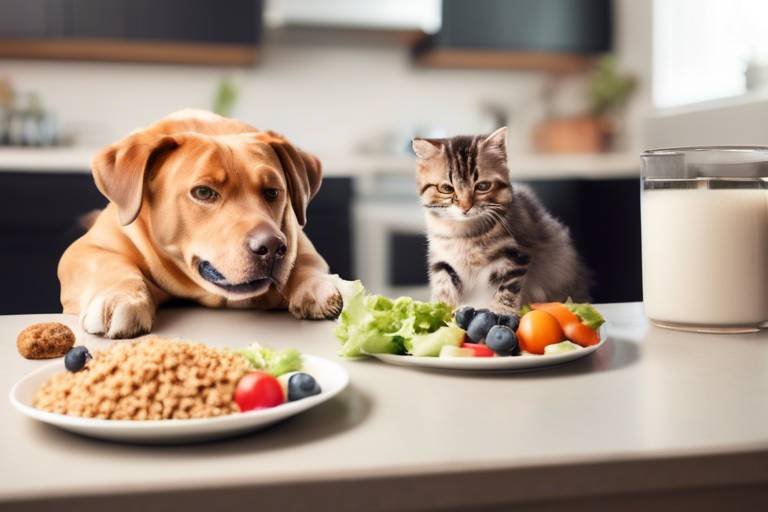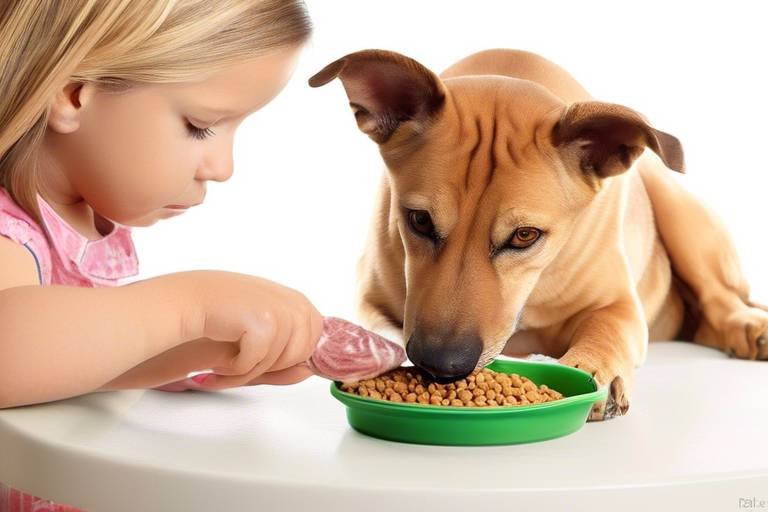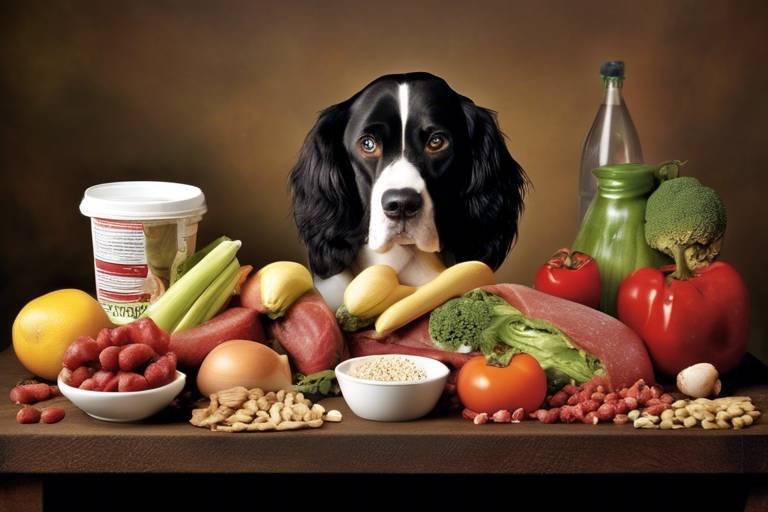The Benefits of Home-Cooked Meals for Pets
Have you ever watched your furry friend devour their food with sheer delight? It's a heartwarming sight, isn't it? But what if I told you that you could enhance that experience and provide even greater benefits by preparing home-cooked meals? In this article, we’ll explore the numerous advantages of cooking for your pets, from improved health to cost savings and the joy of bonding through shared meals. Let's dive in!
One of the most significant benefits of home-cooked meals is the improved nutritional value they offer. When you cook for your pets, you have the unique ability to tailor their diets according to their specific needs. For instance, if your dog is a bit on the chubby side, you can adjust the ingredients to include more vegetables and lean proteins while cutting back on carbs. This leads to better overall health and vitality, ensuring your pet gets the right balance of nutrients. Imagine knowing exactly what's going into your pet's bowl and being assured of its quality!
Let’s face it—pet food can be pricey. But cooking at home can be a cost-effective solution. By purchasing ingredients in bulk, you can save a significant amount of money over time. For example, buying chicken or rice in larger quantities often leads to lower prices per serving. Plus, when you prepare meals yourself, you can avoid the hidden costs associated with commercial pet foods, such as marketing and packaging. Not to mention, you can create multiple meals at once, allowing for easy meal prep that saves time and money!
Do you have a pet that suffers from allergies? Home-cooked meals can be a game-changer! By controlling the ingredients, you can easily identify and eliminate allergens from your pet's diet. This not only improves their comfort but can also lead to a noticeable enhancement in their overall health. For instance, if you discover your pet is allergic to chicken, you can switch to turkey or fish without any hassle. This level of control is simply not possible with commercial pet foods, where ingredients can often be vague or hidden.
Cooking for your pet isn't just about nutrition; it’s also about bonding. The act of preparing meals can strengthen the relationship between you and your furry friend. Just think about it: when you cook together, you create shared experiences that foster trust and affection. Watching your pet eagerly await their meal, knowing you prepared it with love, can be incredibly rewarding. It’s like having your own little dinner party every day!
Another fantastic aspect of home-cooked meals is the control over ingredients. By cooking at home, you can ensure that your pets consume fresh, wholesome, and safe meals. You can choose organic vegetables, free-range meats, and avoid preservatives or fillers that are often found in commercial pet foods. This level of transparency in your pet's diet can give you peace of mind, knowing that you’re providing the best possible nutrition for your beloved companion.
Let’s talk about flavor! Home-cooked meals offer a world of variety that commercial pet foods simply cannot match. You can experiment with different recipes, flavors, and textures, keeping mealtime exciting for your pets. Imagine serving up a delightful mix of sweet potatoes, carrots, and lean beef one day, and a delicious chicken and rice dish the next. This variety not only prevents boredom but also encourages a more enthusiastic approach to mealtime, which can improve your pet’s appetite and overall enjoyment of food.
Maintaining a healthy weight is crucial for your pet’s well-being, and home-cooked meals can significantly aid in this effort. By preparing meals yourself, you can monitor portion sizes and calorie intake, making it easier to keep your pet at a healthy weight. This is especially important for pets prone to obesity-related health issues. Think of it as being their personal chef, ensuring they get just the right amount without overindulging!
If your pet has specific health conditions or dietary restrictions, home-cooked meals can be incredibly beneficial. You can customize recipes to meet their unique nutritional requirements, whether they need a low-carb diet or extra fiber. This flexibility allows you to provide the best care possible, ensuring your pet thrives under your watchful eye.
Feeding your pet home-cooked meals can lead to positive behavioral changes. A balanced diet contributes to better mood, energy levels, and overall well-being. You may notice your pet is more playful, alert, and engaged after switching to home-cooked meals. It’s like providing them with a happiness boost in every bite!
- Can all pets eat home-cooked meals? - While many pets can benefit from home-cooked meals, it's essential to consult with your vet to ensure the diet meets their specific needs.
- How do I know what ingredients to use? - Research and consult with a veterinarian or a pet nutritionist to create balanced meals tailored to your pet's health requirements.
- Is it time-consuming to cook for my pet? - Initially, it may take some time to prepare meals, but once you get the hang of it, meal prep can be quick and efficient.
- Can I use leftovers from my meals for my pet? - Yes, as long as the leftovers are safe for pets and do not contain harmful ingredients like onions or garlic.
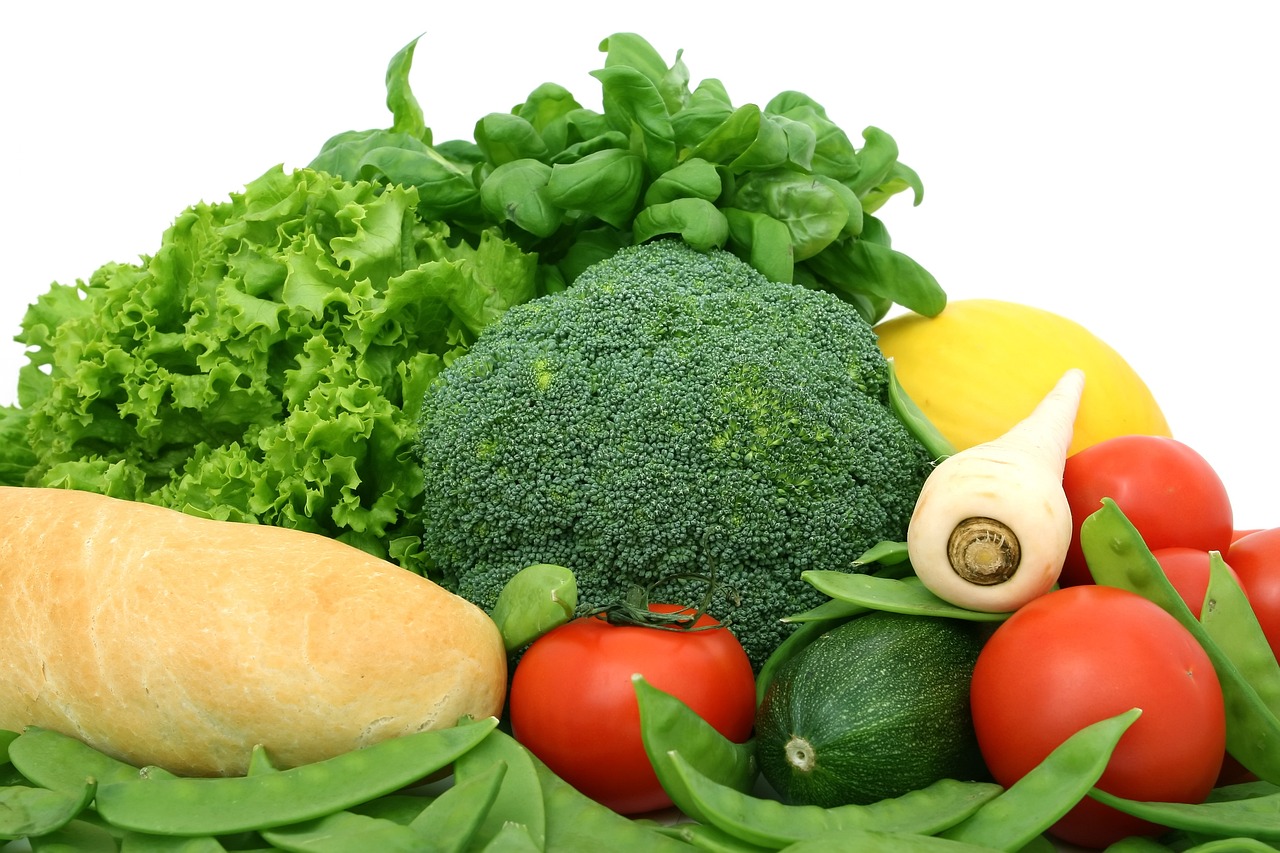
Improved Nutritional Value
This article explores the numerous advantages of preparing home-cooked meals for your pets, including health benefits, cost-effectiveness, and the joy of bonding through cooking.
When it comes to our beloved pets, nutrition is paramount. One of the most significant advantages of home-cooked meals is the ability to tailor their diets specifically to their needs. Unlike commercial pet foods that often contain fillers and preservatives, home-cooked meals allow pet owners to select high-quality ingredients that promote optimal health. This customization means you can incorporate fresh vegetables, lean proteins, and wholesome grains, ensuring your furry friend gets a balanced diet.
Consider this: just like humans, pets thrive on a diet rich in essential nutrients. By cooking at home, you can easily include ingredients that are beneficial for their health. For example, adding carrots can boost their vision, while salmon provides omega-3 fatty acids for a shiny coat. This personalized approach to pet nutrition not only enhances their vitality but also helps in managing specific health issues.
Moreover, home-cooked meals can help you avoid common allergens found in commercial pet foods. By controlling the ingredients, you can eliminate potential irritants, which is especially important for pets with food sensitivities. This means you can create a diet that is not only nutritious but also safe and tailored to your pet's unique needs.
| Nutrient | Benefit | Source |
|---|---|---|
| Protein | Builds and repairs tissues | Chicken, Beef, Fish |
| Vitamins | Boosts immune function | Fruits and Vegetables |
| Fats | Provides energy and supports cell function | Fish Oil, Flaxseed Oil |
| Fiber | Aids digestion | Brown Rice, Sweet Potatoes |
In summary, home-cooked meals offer that can significantly enhance your pet's health and well-being. By choosing fresh, wholesome ingredients, you not only ensure that your pet receives the nutrients they need but also foster a deeper connection through the act of cooking. Isn't it amazing how a simple meal can make such a profound difference?
Cooking for your pets can be more economical than purchasing commercial pet foods, especially when buying ingredients in bulk, allowing pet owners to save money while providing high-quality meals.
Home-cooked meals enable pet owners to control ingredients, making it easier to identify and eliminate allergens from their pets' diets, ultimately improving their comfort and health.
Preparing meals for your pets can strengthen the bond between owner and pet, as shared mealtime experiences foster trust, affection, and a deeper connection.
By cooking at home, pet owners gain complete control over the quality and source of ingredients, ensuring their pets consume fresh, wholesome, and safe meals.
Home-cooked meals allow for greater variety and flavor in pets' diets, preventing boredom and encouraging a more enthusiastic approach to mealtime, which can improve their appetite.
Home-cooked meals provide the opportunity to monitor portion sizes and calorie intake, aiding in maintaining a healthy weight for pets and preventing obesity-related health issues.
Pets with specific health conditions or dietary restrictions benefit from home-cooked meals, as owners can customize recipes to meet their unique nutritional requirements.
Feeding pets home-cooked meals can lead to positive behavioral changes, as a balanced diet contributes to better mood, energy levels, and overall well-being.
- Can I use leftover human food for my pet? - While some leftovers are safe, it's essential to avoid foods that are toxic to pets, like onions, garlic, and chocolate.
- How do I know if my pet's diet is balanced? - Consult with a veterinarian or a pet nutritionist to ensure your pet's meals meet their specific dietary needs.
- What are some easy recipes for home-cooked pet meals? - Simple recipes include boiled chicken with vegetables or ground turkey mixed with brown rice.

Cost-Effectiveness
When it comes to feeding our beloved pets, the **cost-effectiveness** of home-cooked meals is often a game changer. Imagine this: instead of pouring out expensive commercial pet food that might not even meet your pet's specific needs, you can whip up a nutritious meal at home for a fraction of the cost. By purchasing ingredients in bulk and taking advantage of seasonal produce, pet owners can significantly reduce their overall spending. For instance, a simple chicken and vegetable stew can be made for a mere fraction of the price of pre-packaged pet food, and you have the added peace of mind that you know exactly what your furry friend is eating.
Let's break it down a bit further. When you opt for home-cooked meals, you’re not just saving money on the food itself; you’re also cutting down on the hidden costs associated with commercial pet foods. Many of these products contain fillers and low-quality ingredients that can lead to health issues down the line, potentially resulting in costly vet visits. By investing a little time into preparing meals at home, you can help prevent these issues and save on those unexpected expenses.
Moreover, let's consider the **long-term savings**. Home-cooked meals can lead to healthier pets, which in turn can mean fewer trips to the vet. You can monitor your pet's health closely and adjust their diet as needed, ensuring they remain fit and healthy. This proactive approach to your pet's nutrition can save you a substantial amount of money in the long run. Just think about it: a well-fed, healthy pet is less likely to develop chronic conditions that require expensive treatments.
To illustrate the cost-effectiveness of home-cooked meals, here’s a quick comparison of the average costs:
| Feeding Option | Average Monthly Cost |
|---|---|
| Commercial Pet Food | $40 - $70 |
| Home-Cooked Meals | $30 - $50 |
As you can see, cooking at home not only provides a **healthier option** for your pet but also allows you to keep more money in your pocket. Plus, the joy of creating a meal for your pet that you know is packed with nutrients and love is priceless. So, why not give it a try? You might just find that cooking for your pet is not only cost-effective but also a rewarding experience that enhances your bond.
- Is it really cheaper to cook for my pet at home? Yes, in many cases, cooking at home can be more economical than buying commercial pet food, especially when you buy ingredients in bulk.
- What ingredients should I use for home-cooked pet meals? Focus on high-quality proteins, fresh vegetables, and whole grains. Always consult with your veterinarian to ensure you're meeting your pet's nutritional needs.
- Can I save time by cooking in bulk? Absolutely! Preparing larger batches of food can save you time, and you can freeze portions for later use.
- Will my pet enjoy home-cooked meals? Most pets love the taste of fresh, home-cooked meals, and the variety you can offer will keep mealtime exciting!
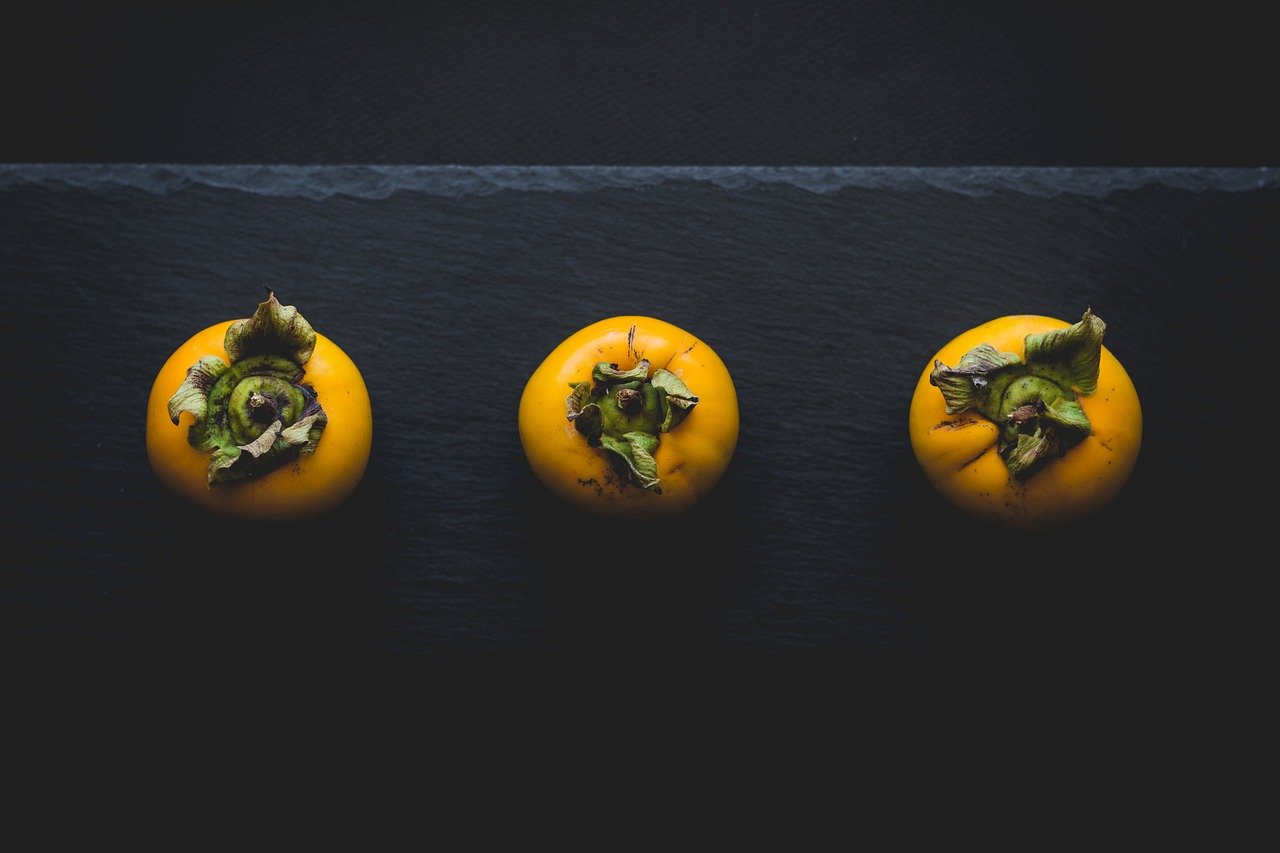
Allergy Management
This article explores the numerous advantages of preparing home-cooked meals for your pets, including health benefits, cost-effectiveness, and the joy of bonding through cooking.
Home-cooked meals allow pet owners to tailor their pets' diets, ensuring they receive optimal nutrition tailored to their specific needs, leading to better overall health and vitality.
Cooking for your pets can be more economical than purchasing commercial pet foods, especially when buying ingredients in bulk, allowing pet owners to save money while providing high-quality meals.
Allergies in pets can be a real headache for both the pet and the owner. By preparing home-cooked meals, you gain the ability to control the ingredients that go into your pet's diet, which is crucial for managing food allergies effectively. Imagine being able to pinpoint exactly what your furry friend is eating—no more guessing games! This level of control is simply not possible with most commercial pet foods, which often contain fillers and preservatives that can trigger allergic reactions.
When you cook at home, you can easily identify and eliminate potential allergens. For instance, if you notice your pet scratching more than usual or experiencing digestive issues, you can experiment by removing specific ingredients one at a time. This method not only helps in identifying the allergens but also in creating a tailored diet that suits your pet's unique needs.
Here's a quick comparison of common allergens found in commercial pet foods versus the control you have with home-cooked meals:
| Common Allergens in Commercial Pet Foods | Control with Home-Cooked Meals |
|---|---|
| Wheat | Can be eliminated or substituted with rice or oats |
| Beef | Can be replaced with chicken, turkey, or fish |
| Dairy | Can be avoided entirely or used in moderation |
| Artificial Preservatives | Not used at all in home-cooked meals |
By taking the reins on your pet's diet, you can significantly improve their comfort and health. Allergies can lead to a host of negative side effects, including chronic itching, gastrointestinal distress, and even behavioral issues. With home-cooked meals, you can ensure that your pet is not only safe from allergens but also thriving in their overall well-being.
Preparing meals for your pets can strengthen the bond between owner and pet, as shared mealtime experiences foster trust, affection, and a deeper connection.
By cooking at home, pet owners gain complete control over the quality and source of ingredients, ensuring their pets consume fresh, wholesome, and safe meals.
Home-cooked meals allow for greater variety and flavor in pets' diets, preventing boredom and encouraging a more enthusiastic approach to mealtime, which can improve their appetite.
Home-cooked meals provide the opportunity to monitor portion sizes and calorie intake, aiding in maintaining a healthy weight for pets and preventing obesity-related health issues.
Pets with specific health conditions or dietary restrictions benefit from home-cooked meals, as owners can customize recipes to meet their unique nutritional requirements.
Feeding pets home-cooked meals can lead to positive behavioral changes, as a balanced diet contributes to better mood, energy levels, and overall well-being.
- What are the benefits of home-cooked meals for pets? Home-cooked meals provide better nutritional value, cost savings, and allergen control, among other benefits.
- Can I cook the same food for my pet as I do for myself? While some ingredients are safe for pets, be cautious and consult a vet to ensure the food is appropriate for your pet's dietary needs.
- How can I identify allergens in my pet's diet? Keep a food diary and note any changes in behavior or health; eliminate suspected allergens one at a time to see if symptoms improve.
- Is it expensive to cook for my pet? It can be cost-effective, especially when buying ingredients in bulk and avoiding commercial pet food prices.

Enhanced Bonding Experience
When you think about the relationship you have with your furry friend, it’s hard not to smile. Pets are more than just companions; they become family. One of the most delightful ways to deepen this bond is through the simple act of preparing home-cooked meals. Imagine the joy of cooking for your pet, much like you would for a loved one. This shared experience not only enhances your pet's diet but also creates moments that strengthen your connection.
Cooking for your pet allows you to engage in a meaningful ritual. Just like how we enjoy cooking for our family and friends, whipping up a special meal for your pet can be a heartfelt experience. It’s not just about the food; it’s about the love and effort you put into it. Each time you chop vegetables or mix ingredients, you’re demonstrating care and affection. Your pet can sense this, and it fosters a sense of trust and security.
Moreover, mealtime becomes an exciting event rather than just a mundane routine. When you serve a home-cooked meal, it’s like throwing a mini celebration! You might notice your pet's tail wagging with anticipation, or their eyes lighting up as you set the bowl down. This enthusiasm is infectious and can lead to a more joyful atmosphere in your home. Just picture this: you and your pet, sharing a moment of happiness as they enjoy their meal, tail wagging and all. It’s moments like these that create lasting memories.
Additionally, cooking together can be a fun activity that involves the whole family. Kids can help mix ingredients or choose recipes, making it a delightful bonding experience. Not only will your pet appreciate the effort, but your family will also cherish the time spent together. This shared joy can teach children about responsibility and care for animals, instilling values that last a lifetime.
In essence, preparing home-cooked meals for your pet is more than just fulfilling a dietary need; it’s about creating connections. The act of cooking becomes a labor of love, and the rewards are immeasurable. You’re not just feeding your pet; you’re nurturing a relationship that thrives on trust, affection, and shared experiences. So, why not grab an apron and start whipping up something special? Your pet will thank you with every wag of their tail!
- Can I cook all types of food for my pet? - It's essential to research which ingredients are safe for pets, as some human foods can be harmful to them.
- How do I know if my pet is enjoying the home-cooked meals? - Look for signs of excitement during meal prep and a happy eating demeanor when serving their food.
- Is cooking for my pet time-consuming? - It can be, but with meal prepping and simple recipes, it can be quite manageable.
- What if my pet has special dietary needs? - Consult with your veterinarian to tailor recipes that meet your pet's specific health requirements.

Control Over Ingredients
When it comes to our beloved pets, one of the most important aspects of their diet is the quality of the ingredients they consume. By preparing home-cooked meals, pet owners gain complete control over what goes into their furry friends' bowls. This means you can select the freshest, highest-quality ingredients, ensuring that your pets are not only eating well but are also free from harmful additives commonly found in commercial pet foods. Imagine being able to choose organic vegetables, high-quality meats, and wholesome grains without any hidden preservatives or artificial flavors. It’s like being a chef for your pet, crafting meals that are not only nutritious but also delicious!
Additionally, having control over ingredients allows you to cater to your pet's specific dietary needs. For instance, if your dog is allergic to certain grains or your cat has a sensitivity to chicken, you can easily adjust recipes accordingly. This level of customization is a game changer, providing peace of mind that your pet is getting exactly what they need. You can even experiment with different ingredients to find out what your pet enjoys the most, making mealtime a delightful experience for both of you.
Moreover, the ability to monitor ingredient sources also means you can support local farmers and businesses by purchasing fresh produce and meats from nearby markets. This not only benefits your pet's health but also contributes to the local economy. If you’re curious about the benefits of choosing specific ingredients, here’s a quick breakdown:
| Ingredient | Benefit |
|---|---|
| Chicken | High in protein, promotes muscle health |
| Carrots | Rich in vitamins, supports vision and immune function |
| Brown Rice | Good source of energy, aids digestion |
| Salmon | Contains omega-3 fatty acids, supports skin and coat health |
In essence, cooking for your pets is not just about feeding them; it’s about providing them with the best possible nutrition tailored to their unique needs. You’re not just a pet owner; you’re a dedicated chef, ensuring that every meal is a step towards better health and happiness for your furry companions.
- Can I use regular human food for my pet's meals? Yes, but ensure that the ingredients are safe for your pet. Avoid foods that are toxic to pets like onions, garlic, and chocolate.
- How do I know what ingredients my pet needs? Consult with your veterinarian to understand your pet's specific dietary requirements based on their age, weight, and health conditions.
- Is it time-consuming to prepare home-cooked meals for pets? It can be, but meal prepping in batches can save time. Plus, the benefits for your pet make it worthwhile!
- Can I add supplements to my pet's home-cooked meals? Absolutely! Just make sure to discuss with your vet to find out which supplements are appropriate for your pet.

Variety and Flavor
When it comes to our furry friends, variety is not just the spice of life; it's essential for their well-being. Imagine eating the same meal every single day—how boring would that be? Just like us, pets crave diversity in their diet to keep mealtime exciting and fulfilling. Home-cooked meals allow pet owners to explore a wide array of ingredients, flavors, and textures that commercial pet foods simply can't match. By preparing meals at home, you can introduce an exciting mix of proteins, vegetables, and grains, ensuring that your pet enjoys a well-rounded diet that tantalizes their taste buds.
Consider this: dogs and cats have taste receptors that can detect a variety of flavors, and they thrive when their meals are not monotonous. For instance, you can prepare dishes with chicken, beef, or fish as the main protein, each paired with different vegetables like carrots, peas, or sweet potatoes. This not only keeps their meals interesting but also provides a broader range of nutrients. You could even experiment with herbs and spices—just a pinch of parsley or a dash of turmeric can enhance flavor and offer health benefits, too!
Moreover, cooking at home gives you the freedom to rotate ingredients based on what’s in season or what your pet seems to enjoy the most. If your dog loves pumpkin in the fall, you can whip up a delicious pumpkin stew, while in the summer, a refreshing chicken and cucumber salad can be a hit. This flexibility not only prevents boredom but also encourages your pet to have a more enthusiastic approach to mealtime. After all, a happy pet is one that looks forward to their food!
To put it simply, home-cooked meals are a fantastic way to ensure that your pet receives a varied and flavorful diet. The joy of watching your pet relish their food is unparalleled, and it can even lead to better eating habits, as they learn to appreciate the different tastes and textures you provide. So why settle for the same old kibble when you can be a culinary artist for your beloved pet?
- Can I feed my pet the same home-cooked meal every day? While it's possible, it's best to offer a variety of meals to ensure they receive a balanced diet.
- Are there any ingredients I should avoid when cooking for my pet? Yes, ingredients like chocolate, onions, garlic, and grapes are toxic to pets and should be avoided.
- How can I ensure my home-cooked meals are nutritionally balanced? Consulting with a veterinarian or a pet nutritionist can help you create balanced recipes tailored to your pet's needs.
- Can I use leftovers from my meals for my pet? It depends on the ingredients. Always check if the leftovers are safe for pets before sharing.

Weight Management
When it comes to keeping our furry friends healthy, weight management is a crucial aspect that pet owners should never overlook. Just like humans, pets can struggle with weight issues, and these can lead to serious health problems such as diabetes, heart disease, and joint issues. One of the most effective ways to manage your pet's weight is through home-cooked meals. By preparing their food at home, you can closely monitor their caloric intake and portion sizes, making it easier to ensure that they are not overeating.
Think about it: when you cook for your pets, you have the power to decide exactly what goes into their meals. This means you can create a balanced diet tailored to their specific energy needs. For instance, if you have a less active pet, you can reduce the calorie content of their meals, while ensuring that your more active pet gets the energy they need to thrive. This level of control is often not possible with commercial pet foods, which can be loaded with fillers and preservatives that contribute to weight gain.
Additionally, home-cooked meals allow you to incorporate healthy ingredients that support weight management. Foods like lean meats, vegetables, and whole grains can be combined to create nutritious meals that are lower in calories but high in essential nutrients. Here’s a simple breakdown of how you can balance your pet's diet:
| Food Type | Benefits |
|---|---|
| Lean Proteins (e.g., chicken, turkey) | Helps build muscle while keeping calories low |
| Vegetables (e.g., carrots, peas) | Low in calories and high in fiber, promoting fullness |
| Whole Grains (e.g., brown rice, quinoa) | Provides energy and aids digestion |
Another benefit of home-cooking is the ability to introduce variety into your pet's diet, which can prevent them from becoming bored with their meals. A bored pet is more likely to overeat or become picky, leading to unhealthy eating habits. By mixing up their meals with different ingredients and flavors, you can keep mealtime exciting and encourage your pet to enjoy their food without overindulging.
Finally, let’s not forget the emotional aspect of feeding your pets. When you prepare meals for them, you’re not just providing sustenance; you’re showing love and care. This can lead to a more positive relationship with food, encouraging healthy eating habits that last a lifetime. After all, a happy pet is a healthy pet!
- How do I know how much to feed my pet? Consult your veterinarian for guidance based on your pet's age, weight, and activity level.
- Can I use leftovers for my pet's meals? Yes, but ensure that the leftovers are pet-friendly and free from harmful ingredients like onions or garlic.
- What if my pet has specific dietary restrictions? Home-cooked meals are perfect for customizing recipes to meet your pet’s unique needs.
- How can I transition my pet to home-cooked meals? Gradually introduce home-cooked meals by mixing them with their current food to avoid digestive upset.

Support for Special Dietary Needs
When it comes to our furry friends, one size does not fit all, especially regarding their diets. Just like humans, pets can have special dietary needs that require a little extra attention. Whether your pet has food allergies, sensitivities, or specific health conditions, preparing home-cooked meals can be a game-changer. Imagine knowing exactly what goes into your pet's food, allowing you to customize their meals to meet their unique requirements. This level of control not only ensures that your pet gets the right nutrients but also helps avoid ingredients that could trigger adverse reactions.
For instance, if your dog is allergic to chicken, you can easily substitute it with turkey or beef in your homemade recipes. This flexibility allows you to create a balanced diet tailored to your pet's specific needs. You can use a variety of wholesome ingredients such as vegetables, grains, and proteins to ensure they receive a comprehensive range of nutrients. Plus, cooking at home means you can avoid artificial additives and preservatives often found in commercial pet foods, which can be particularly beneficial for pets with sensitive stomachs.
Additionally, pets with conditions like diabetes or kidney disease often require strict dietary management. By preparing meals at home, you can work closely with your veterinarian to develop a meal plan that supports their health while still being delicious. For example, you might create a low-carb recipe for a diabetic dog, ensuring they get the right amount of protein and fiber without the extra sugars. This direct involvement in your pet's nutrition not only enhances their well-being but also fosters a sense of responsibility and love.
Moreover, the process of cooking for your pets can be incredibly rewarding. It allows you to experiment with different ingredients and recipes, keeping mealtime exciting for both you and your furry companion. You might find that your pet enjoys a variety of foods, from sweet potatoes to carrots, which can be easily incorporated into their meals. The joy of watching your pet savor a meal you’ve prepared can be one of the most fulfilling experiences as a pet owner.
In summary, cooking at home for pets with special dietary needs not only provides a tailored nutritional approach but also strengthens the bond between you and your pet. It's a wonderful way to show love and care while ensuring they lead a healthy, happy life.
- Can I feed my pet a vegetarian diet? - While some pets can thrive on a vegetarian diet, it's crucial to consult with a veterinarian to ensure they receive all necessary nutrients.
- How do I know if my pet has food allergies? - Common signs include itching, gastrointestinal upset, and ear infections. A vet can help diagnose food allergies.
- What are some safe ingredients for home-cooked pet meals? - Safe ingredients include lean meats, certain vegetables (like carrots and peas), and grains like rice or oats.
- How can I ensure my home-cooked meals are nutritionally balanced? - Work with a veterinarian or a pet nutritionist to create balanced recipes tailored to your pet's needs.

Positive Behavioral Changes
This article explores the numerous advantages of preparing home-cooked meals for your pets, including health benefits, cost-effectiveness, and the joy of bonding through cooking.
Home-cooked meals allow pet owners to tailor their pets' diets, ensuring they receive optimal nutrition tailored to their specific needs, leading to better overall health and vitality.
Cooking for your pets can be more economical than purchasing commercial pet foods, especially when buying ingredients in bulk, allowing pet owners to save money while providing high-quality meals.
Home-cooked meals enable pet owners to control ingredients, making it easier to identify and eliminate allergens from their pets' diets, ultimately improving their comfort and health.
Preparing meals for your pets can strengthen the bond between owner and pet, as shared mealtime experiences foster trust, affection, and a deeper connection.
By cooking at home, pet owners gain complete control over the quality and source of ingredients, ensuring their pets consume fresh, wholesome, and safe meals.
Home-cooked meals allow for greater variety and flavor in pets' diets, preventing boredom and encouraging a more enthusiastic approach to mealtime, which can improve their appetite.
Home-cooked meals provide the opportunity to monitor portion sizes and calorie intake, aiding in maintaining a healthy weight for pets and preventing obesity-related health issues.
Pets with specific health conditions or dietary restrictions benefit from home-cooked meals, as owners can customize recipes to meet their unique nutritional requirements.
Feeding pets home-cooked meals can lead to that enhance their overall well-being. When pets consume a diet rich in nutrients, they often exhibit improved mood and energy levels. Imagine a dog that used to be lethargic and disinterested in playtime suddenly bounding around with excitement after a nutritious meal! This transformation is not just anecdotal; it's backed by science. A balanced diet plays a crucial role in regulating a pet's mood and energy, which can lead to significant behavioral improvements.
Moreover, a well-nourished pet is less likely to suffer from anxiety or stress-related behaviors. For instance, a cat that used to hide or act aggressively may become more social and confident when fed a diet that meets its nutritional needs. This change can be attributed to the fact that a healthy diet supports brain function and emotional health.
To further illustrate, consider the following benefits of home-cooked meals on pet behavior:
- Increased Energy Levels: Pets with proper nutrition tend to be more active and playful.
- Improved Mood: A balanced diet can help reduce irritability and anxiety.
- Enhanced Focus: Well-fed pets are more attentive during training sessions.
In conclusion, the simple act of preparing home-cooked meals can yield profound effects on your pet's behavior, leading to a happier, more engaged companion. It's not just about feeding them; it's about nurturing their overall health and happiness!
- Can I feed my pet the same home-cooked meal every day?
While variety is important, it's essential to ensure that the meals are balanced and meet your pet's nutritional needs. Consult with a veterinarian for specific recommendations. - How do I know if my home-cooked meals are healthy for my pet?
It's best to work with a vet or a pet nutritionist to create a balanced diet plan that suits your pet's unique health requirements. - Are there any foods I should avoid when cooking for my pet?
Yes, some human foods, like chocolate, onions, and garlic, can be toxic to pets. Always research and consult with a vet before introducing new ingredients.
Frequently Asked Questions
- What are the main benefits of home-cooked meals for pets?
Home-cooked meals provide numerous advantages, including improved nutritional value, cost-effectiveness, and the ability to manage allergies. They also enhance the bonding experience between pets and owners, giving you complete control over ingredients and allowing for a greater variety of flavors in your pet's diet.
- How can home-cooked meals improve my pet's health?
By preparing meals at home, you can tailor your pet's diet to meet their specific nutritional needs, leading to better overall health and vitality. This customization helps in managing weight, supporting special dietary needs, and promoting positive behavioral changes.
- Is cooking for my pet more cost-effective than buying commercial pet food?
Yes! Cooking for your pet can be more economical, especially when purchasing ingredients in bulk. You can save money while providing high-quality, nutritious meals that are often more beneficial than some commercial options.
- Can home-cooked meals help with my pet's allergies?
Absolutely! Home-cooked meals allow you to control the ingredients, making it easier to identify and eliminate allergens from your pet's diet. This can lead to improved comfort and overall health for your furry friend.
- How does cooking for my pet enhance our bond?
Preparing meals for your pet creates shared experiences that foster trust and affection. The act of cooking together can strengthen the emotional connection you share, making mealtime a joyful occasion.
- What types of ingredients should I use for home-cooked pet meals?
It's best to use fresh, wholesome ingredients that are safe for pets. Lean meats, vegetables, and grains are great options. Always consult with your veterinarian to ensure that the ingredients meet your pet's dietary requirements.
- Can I manage my pet's weight with home-cooked meals?
Yes! Home-cooked meals allow you to monitor portion sizes and calorie intake effectively. This is crucial in maintaining a healthy weight and preventing obesity-related health issues.
- Are there specific recipes for pets with dietary restrictions?
Definitely! Home-cooked meals are customizable, allowing you to create recipes that cater to your pet's unique dietary needs. Always consult with a veterinarian for guidance on the best ingredients and recipes for your pet's specific health conditions.
- Will my pet's behavior change if I switch to home-cooked meals?
Yes, many pet owners report positive behavioral changes after switching to home-cooked meals. A balanced diet contributes to better mood, energy levels, and overall well-being, which can lead to a happier and more active pet.


